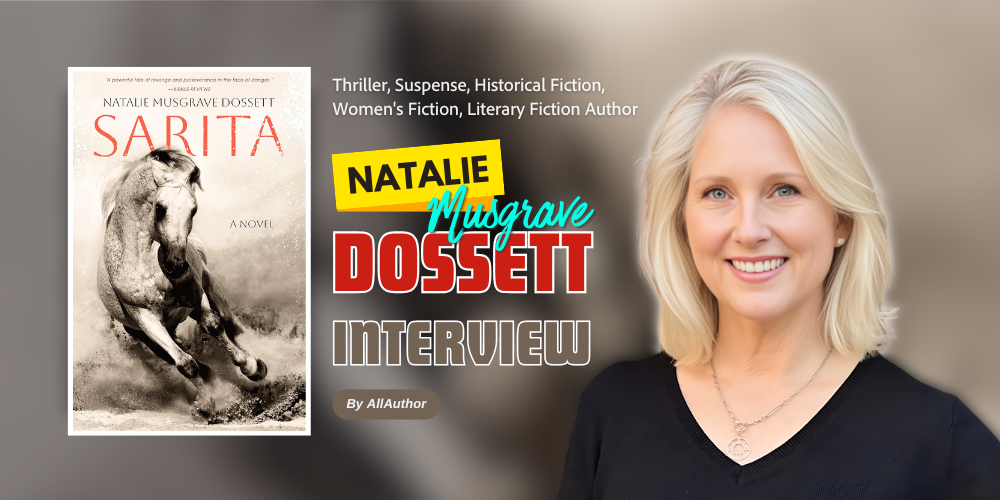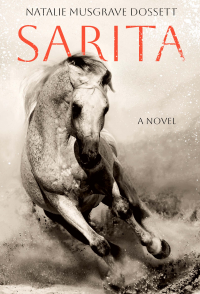Genre:
Thriller Suspense Historical Fiction Women's Fiction Literary Fiction- Country: United States
- Books: 1
- Profession: writer
- Born: 12 February
- Member Since: Jul 2024
- Profile Views: 1,344
- Followers: 94
- VISIT AUTHOR: Website, Twitter, Instagram, Goodreads, Amazon,
Natalie Musgrave Dossett grew up in San Antonio, spending a great deal of time on family ranches in deep South Texas, a place her great-grandmother referred to as an acquired taste. A seventh-generation Texan, Natalie was raised on tales (most of them tall) of the Wild Horse Desert. Her love of history and writing was nurtured by wonderful high school teachers at Saint Mary’s Hall and strengthened while earning a BA in History at Vanderbilt University. She lives in Dallas and enjoys a large and growing family with her husband.
Natalie Musgrave Dossett's Books
Stay in the loop on books by Natalie Musgrave Dossett. See upcoming and best-selling books by the author here. You'll also find the deals on books by Natalie Musgrave Dossett.
** Please note that the information or price displayed here may not be the updated. Make sure to double-check the latest book price before buying books.
** Also, there might be other books by Natalie Musgrave Dossett not listed on AllAuthor.
| Book |
|---|
Natalie Musgrave Dossett Interview On 07, Jan 2025
 "Natalie Musgrave Dossett, a seventh-generation Texan, grew up in San Antonio and spent much of her time on family ranches in the Wild Horse Desert of deep South Texas. Raised on captivating tales of the region, her love of history and writing flourished through inspiring high school teachers at Saint Mary’s Hall and continued to grow with a BA in History from Vanderbilt University. Now living in Dallas with her husband, Natalie enjoys the company of a large, growing family while continuing to write and explore her passion for storytelling."
"Natalie Musgrave Dossett, a seventh-generation Texan, grew up in San Antonio and spent much of her time on family ranches in the Wild Horse Desert of deep South Texas. Raised on captivating tales of the region, her love of history and writing flourished through inspiring high school teachers at Saint Mary’s Hall and continued to grow with a BA in History from Vanderbilt University. Now living in Dallas with her husband, Natalie enjoys the company of a large, growing family while continuing to write and explore her passion for storytelling."
Greatly! I have a family of storytellers. I didn't realize how much the stories about ancestors and family that I grew up hearing had influenced me until they appeared in my narratives in different ways.
Your great-grandmother described the South Texas landscape as "an acquired taste." How does this sentiment influence the way you portray setting and place in your work?I understand what she was saying - the South Texas landscape can be austere. However, there is so much beauty and strength in it. I wanted to show appreciation for that and highlight it. Sometimes what isn't obvious can have the deepest affect.
As a seventh-generation Texan, family history must play a big role in your life. How do you incorporate your family's stories, especially the "tall tales," into your writing?Family lore likely exists in everyone's experience. I didn't realize how much I had internalized it until I started writing. Sarita's quest has a great deal to do with legacy, which has been a big part of my family narrative.
What specific elements of the Wild Horse Desert and Texas history do you find most fascinating, and how do they show up in your work?The Wild Horse Desert, or Nueces Strip, was an area of dispute for much longer than I realized. As Sarita navigates her own family tragedy, she learns how deeply affected the original settlers of South Texas had been by the Treaty of Hidalgo and how much resentment still lingered.
Also, while doing research I discovered how many brave women took part in all aspects of South Texas history. Yet, few of them are well-known. Often women were left to run ranches and operate cattle business alone as widows while still raising families and running households. I wanted to highlight this fact and bring attention to the expansive role women have played.
Who or what inspired your passion for writing, and how did your love of history influence your approach to storytelling?I was encouraged to read from an early age. When I visited my grandmother, she would always leave a book in my room and expect a report on it. My father always had a book he was reading. It was just a part of my life, and I think you have to be a reader to be a writer. I'm not sure I knew the stories I heard growing up were "history" until I was in middle school or later and started placing them into the historical context of what I was learning. Later I discovered Larry McMurtry, Carmac McCarthy, Ken Follett, Philipp Meyer, et al. I loved the idea of learning about another place and time while reading about someone navigating that period.
I took a creative writing course at SMU. When prompted to write about something, Sarita's story started to come out. It seems silly, but it took me a while to realize i was writing historical fiction!
Saint Mary’s Hall and your time at Vanderbilt University were pivotal in shaping your interests. Can you share how your education contributed to your writing career?I had amazing English and Literature teachers in high school. We read the classics, as well as contemporary works, but we were encouraged to draw our own conclusions and express what the books meant to us personally. I also had a wonderful history teacher who pushed me to think about history as it related to the present. He gave me a lot of confidence by submitting my papers to various competitions - I don't think I ever won anything, but the experience was great! Vanderbilt has a long history of notable writers and I think just being on that campus was inspiring. As a history major, I got to write my way through most classes-which I much preferred to taking exams!
Many authors draw on personal experiences when crafting their stories. How much of your personal history or family life finds its way into your work?I think the kernel of my writing is personal, but it grows from there. Sarita's story is her own, but there are broad themes that I have certainly dealt with as well - family legacy being a big one.
You’ve mentioned that you were raised on tales of the Wild Horse Desert. Do you have a favorite family story or legend that has stuck with you over the years?My great-great grandfather was a Texas Ranger. In 1877, while recovering from a gunshot wound and using a cane, he captured John Wesley Hardin (who claimed to have killed more than 40 people) and four of his gang members. Armstrong earned a $4000 reward. He returned to Austin where he proposed to his future wife, Mollie. Mollie's mother had been swindled out of their property by lawyers after her husband's death. Armstrong used his reward money to get that property back. Over the years he added land and the ranch is still owned by his descendants.
How has living in Dallas, a city rich in its own history, influenced your creative process?North Texas and South Texas are very different! But both have an appreciation for the history of their founders and settlers.
What are some of the challenges you face when writing about historical subjects, especially ones that are so deeply intertwined with your family heritage?I feel an obligation to get the historical facts right, especially if writing about an actual person or event. However, I write historical fiction, so the narrative based on those facts can be imagined. There are characters in my book that are based on people that I never met and only heard of, so some of what I write is what I imagine their lives and situations would have been like during that time period. It's a weaving of historical fact and fiction.
Do you feel a responsibility to represent Texas history accurately, or do you prefer to embrace the folklore and embellishment that often comes with family stories?Both! There are stories I heard that I realized through research could not have been accurate! But humans have a long tradition of storytelling, sometimes the facts get blurry but the message remains true.
Can you describe a typical writing day for you? Do you have any rituals or practices that help you stay focused?I am trying to be more disciplined in my writing practice. We have a large family, and for a long time I had to grab time where I could. Now that they are grown and 'out of the nest', I have the opportunity to set my own schedule. Although, I find life often gets in the way still!
Family seems to play a central role in your life. How does your relationship with your growing family influence your work, both in content and in the time you devote to writing?Ha, see above!
As our kids navigate adulthood, I see them grappling with issues that appear no matter what the year or time period. Relationships, raising children, marriage, independence, career - those are things people have always had to deal with. I like incorporating those things in my writing because they are relatable to different generations.
What advice would you give to aspiring writers who are also balancing personal histories and cultural legacies in their work?Research, research, research. We can find so much on line now - although it needs to be vetted - but I think it's also important to talk to people. I'm lucky that my parents are still around and I can get insight from them. I also had a grandmother who passed down boxes full of family information - letters, photos, books - that have been invaluable.
I think you have to be true to the time you are writing about, but try to explore the reasons for certain behaviors, not to excuse them but to understand them.
What has your AllAuthor experience been like so far? What are some highlights?AllAuthor has been a great resource. As a first-time published author, I've found their marketing and promotion advice and tools very helpful. The user friendly platform is great.
Ask Natalie Musgrave Dossett a Question
Have brimming questions to ask author Natalie Musgrave Dossett? Ask whatever you like, but keep it appropriate.
** Please note that unanswered questions will not appear on the page. Refrain from posting promotional messages.


